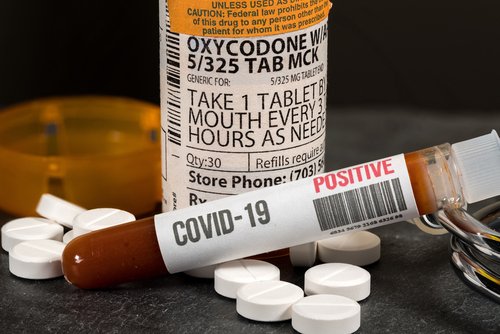You know that the COVID-19 pandemic is rocking the globe, but did you know about its disproportionate impact on people who use drugs?
If you use drugs, then you may have already noticed changes in your community since COVID-19.
Changes in the supply chain lead to shortages of drugs on the black market. When you’re in withdrawal because of a drug shortage, you’re more likely to make unsafe choices, like take other drugs that your body doesn’t tolerate. This can cause overdose and death.
This shortage is already happening with opioid drugs, including heroin and prescription pills.
That isn’t the only way that COVID-19 is hurting people who use drugs. Other problems include less access to treatment resources, trouble getting medication-assisted treatment, or increased risk of overdose in isolation.
Together, all of this can lead to relapse, overdose, and COVID-19 infection for millions of Americans who use drugs. The opioid epidemic will likely see a resurgence this year and into next year due to the pandemic.
Overdoses Increase When Drug Markets Are Disrupted
As COVID-19 takes over the globe, all kinds of supply chains are being interrupted, including illicit drugs.
That means people who are addicted to heroin or prescription opioids may find themselves without a way to get their drug of choice locally.
If you’ve been using heroin or another opioid long-term, you already know that withdrawal can be painful enough to avoid at all costs. That can lead to life-threatening decisions, like:
- Taking an even stronger substitute opioid
- Going back to your old dose after a period of withdrawal
- Taking black market pills that could contain fentanyl or other deadly additives
- Mixing drugs to try to get a stronger high
All of these actions can lead to overdose, and they’re much more likely to happen in times when the drug market is disrupted.
Self-Isolation Can Be Dangerous With Opioids
People who use opioids should never use them alone because of a fatal side effect: respiratory depression.
When you overdose on opioids or mix them with other drugs, your nervous system stops telling your body to breathe at regular intervals. Your breathing will slow and eventually stop if the overdose isn’t reversed.
For that reason, it’s always recommended that people who use opioids don’t do so alone. When you go into respiratory depression, you lose consciousness. You can reverse an overdose with Naloxone, but if you’re passed out, you can’t give yourself the life-saving drug.
That’s why so many opioid overdoses that occur alone end in death.
During COVID-19, many people who use opioids are using alone for the first time. It’s easy to make a mistake that leads to death when you don’t have help.
Treatment Resources Are Stressed
Right now, it’s harder to get treatment for a few reasons:
- Some treatment centers are closing their doors because they don’t have enough staff
- Some hospital substance abuse floors are being repurposed for COVID-19 patients
- People are being advised to recover at home unless treatment is necessary
Of course, anyone with opioid use disorder (OUD) should be able to access treatment. But the reality is, many treatment centers and hospitals are stressed to the max by an influx of COVID-19 cases.
At the same time, people are relapsing and overdosing at higher rates due to the stress of a global pandemic. That means treatment centers with fewer resources are trying to care for more people.
The result is that it can be harder to find a treatment center that’s open and has space for you.
People Have Trouble Getting Buprenorphine
If you use buprenorphine to control opioid withdrawal, then you may have had trouble getting your medication recently.
Doctors have historically required that you come to a clinic every time you receive buprenorphine. That’s because it’s a highly controlled drug and it has some potential for abuse, so doctors prefer keeping it out of patient homes.
But during COVID-19, going to a daily appointment goes against the rules of social distancing.
Some treatment clinics are allowing patients to take home a 28-day supply of buprenorphine at a time rather than going to the clinic daily. They’re also allowing telephone appointments instead of in-person appointments for medication refills.
Still, not all clinics have gotten on board with these regulations at the time of this writing. The result is that people are going without buprenorphine and experiencing withdrawal.
What Can People Who Use Opioids Do to Protect Themselves?
People who use opioids should talk to their treatment provider. More treatment centers are offering telehealth services than ever, and in-person treatment spots are still available for many people who need them.
You can lessen your risk by:
- Maintaining social connections and a support system during isolation
- Not substituting different drugs to avoid withdrawal
- Not taking a high dose after long withdrawal
- Not mixing opioids with other drugs
During the pandemic, Americans can protect themselves by staying in touch with their treatment teams. Awareness can help stop COVID-19 from ramping up the opioid epidemic.

